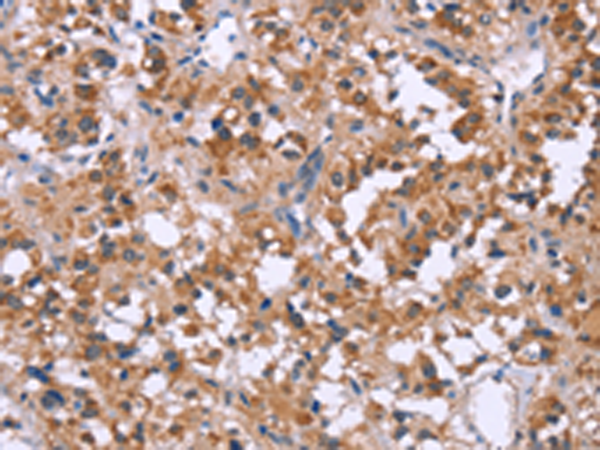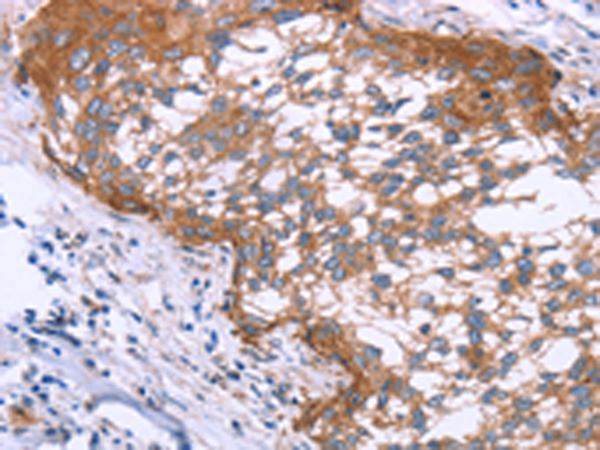


| WB | 咨询技术 | Human,Mouse,Rat |
| IF | 咨询技术 | Human,Mouse,Rat |
| IHC | 1/25-1/100 | Human,Mouse,Rat |
| ICC | 技术咨询 | Human,Mouse,Rat |
| FCM | 咨询技术 | Human,Mouse,Rat |
| Elisa | 1/2000-1/5000 | Human,Mouse,Rat |
| Aliases | CED4 |
| WB Predicted band size | 142 kDa |
| Host/Isotype | Rabbit IgG |
| Antibody Type | Primary antibody |
| Storage | Store at 4°C short term. Aliquot and store at -20°C long term. Avoid freeze/thaw cycles. |
| Species Reactivity | Human, Mouse, Rat |
| Immunogen | Synthetic peptide of human APAF1 |
| Formulation | Purified antibody in PBS with 0.05% sodium azide and 50% glycerol. |
+ +
以下是关于APAF1抗体的示例参考文献(注:以下为模拟示例,非真实文献):
---
1. **文献名称**: *Role of APAF1 in Caspase Activation During Apoptosis*
**作者**: Smith J, et al.
**摘要**: 本研究利用特异性APAF1抗体,通过免疫沉淀和Western blot技术,验证了APAF1在凋亡过程中与caspase-9的相互作用,揭示了其在凋亡体组装中的关键作用。
2. **文献名称**: *APAF1 Expression in Colorectal Cancer: A Prognostic Marker*
**作者**: Lee H, et al.
**摘要**: 通过免疫组化分析(使用APAF1单克隆抗体),发现APAF1在结直肠癌组织中表达显著下调,提示其低表达与患者预后不良及化疗耐药相关。
3. **文献名称**: *Validation of a Novel APAF1 Antibody for Flow Cytometry*
**作者**: Zhang R, et al.
**摘要**: 开发并验证了一种高特异性的APAF1多克隆抗体,适用于流式细胞术和免疫荧光,成功应用于检测辐射诱导的细胞凋亡中APAF1的激活状态。
4. **文献名称**: *APAF1 in Neurodegenerative Disorders: Insights from Mouse Models*
**作者**: García A, et al.
**摘要**: 使用APAF1抗体对阿尔茨海默病模型小鼠脑组织进行Western blot和免疫组化分析,发现APAF1表达水平升高与神经元凋亡程度呈正相关。
---
如需真实文献,建议通过PubMed或Google Scholar检索关键词(如“APAF1 antibody validation”或“APAF1 apoptosis assay”)获取近期研究。
APAF1 (Apoptotic protease-activating factor 1) is a critical protein involved in the intrinsic (mitochondrial) pathway of apoptosis, a programmed cell death process essential for maintaining tissue homeostasis and development. It functions as a central component of the apoptosome, a multi-protein complex that activates caspases, the executioners of apoptosis. Upon cellular stress signals (e.g., DNA damage), cytochrome c released from mitochondria binds to APAF1. triggering its oligomerization into the apoptosome. This structure recruits and activates procaspase-9. initiating a caspase cascade that leads to cell dismantling. Dysregulation of APAF1 is linked to cancer, neurodegenerative disorders, and resistance to chemotherapy.
APAF1 antibodies are vital tools for studying apoptosis mechanisms, protein expression, and localization in various tissues or disease models. They are widely used in techniques like Western blotting, immunohistochemistry (IHC), immunofluorescence (IF), and flow cytometry. Researchers employ these antibodies to investigate APAF1's role in diseases, such as reduced expression in tumors (correlating with poor apoptosis and cancer progression) or aberrant activation in neuroinflammation. Specific antibody clones may target distinct APAF1 domains (e.g., CARD or NOD regions), aiding in functional studies. Validating antibody specificity via knockout controls is crucial, as non-specific binding can occur due to protein homology. Commercial APAF1 antibodies are often developed in hosts like rabbits or mice, with applications spanning basic research and therapeutic discovery.
×